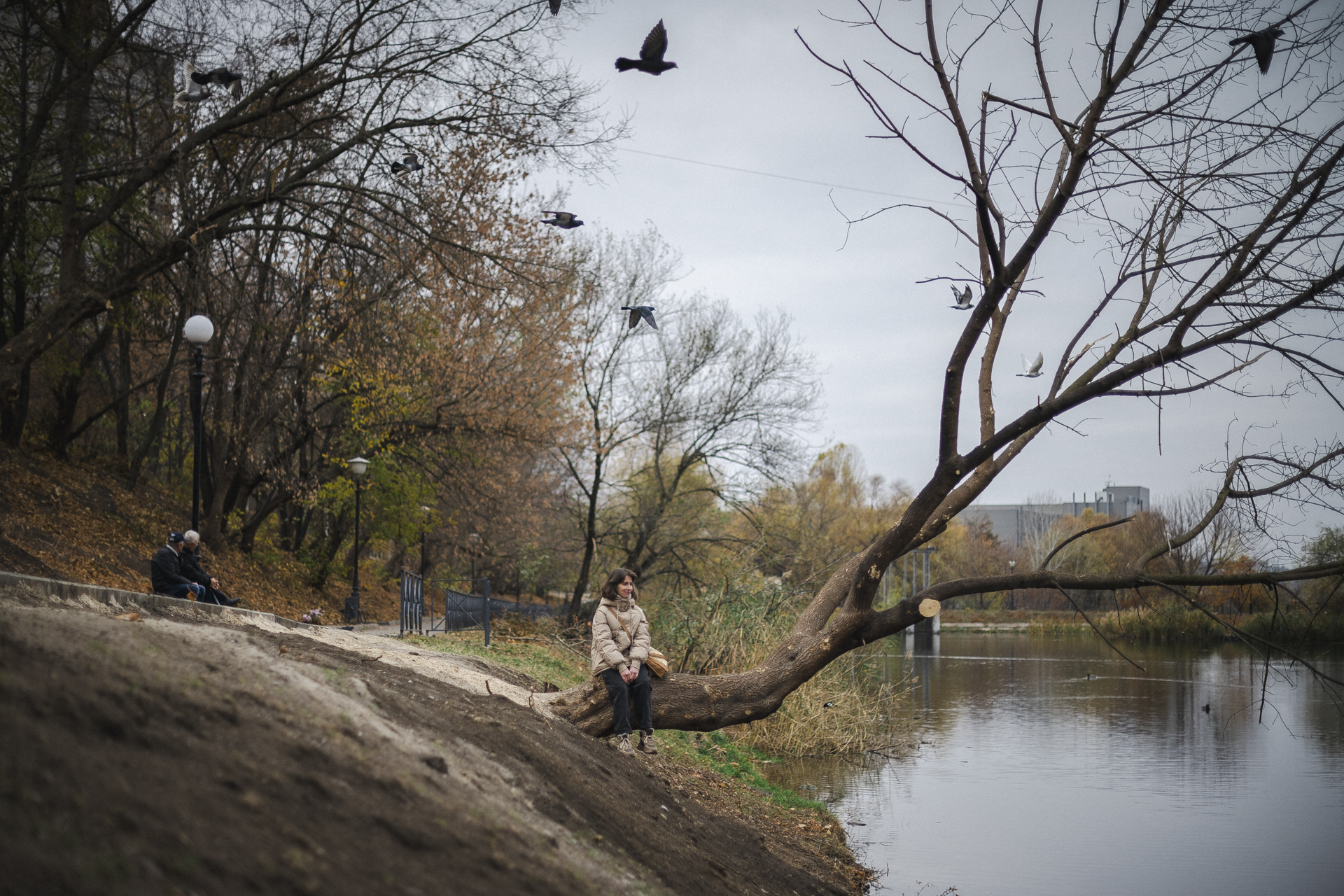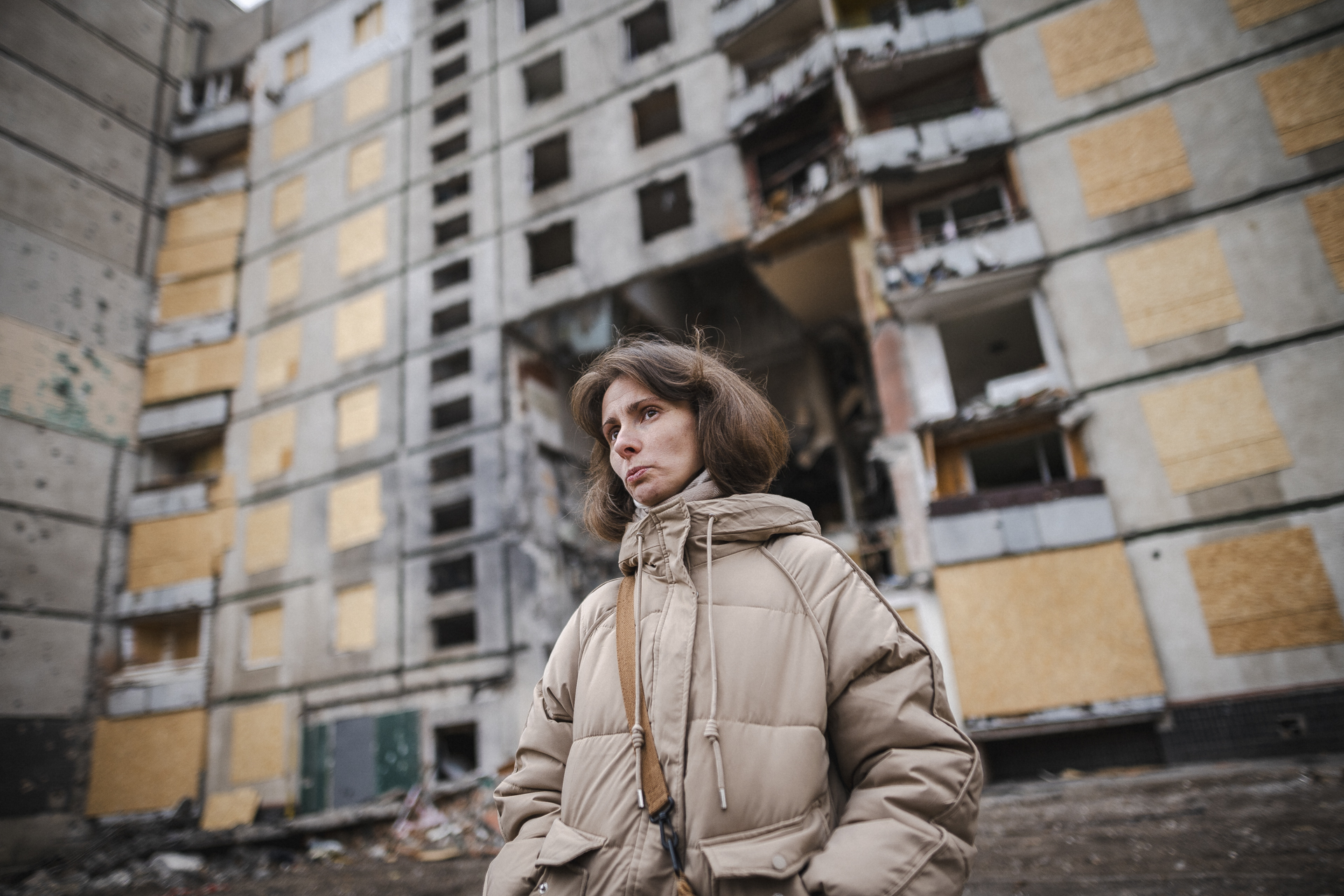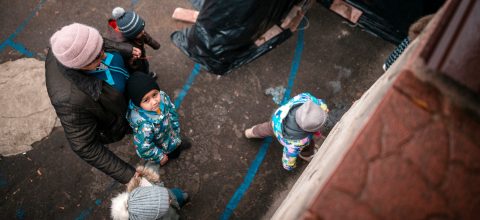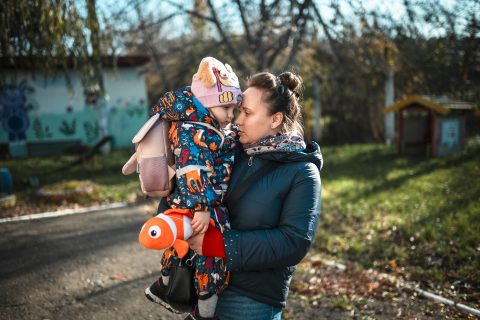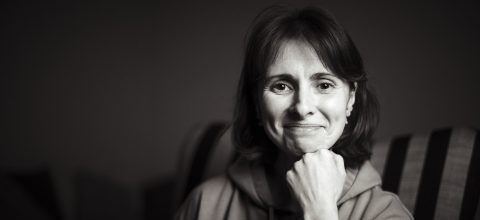Decoding traumatised minds – a psychologist in Kharkiv
When a bomb hit near her home, psychologist Alina Symonenko momentarily forgot everything she had learned in her 16-year career. We met Alina at her home in Saltivka, Kharkivka, in November 2024. In this story, the psychologist explains how the people of Kharkiv are doing after three years of war.
Text: Ulriikka Myöhänen
Interviews: Ulriikka Myöhänen and Veronika Korobko
Photos: Antti Yrjönen
IT HAPPENED last Wednesday. It was a little after eleven. We were at our home in Saltivka, Kharkivka. My son Misha was already asleep, and my daughter Aglaya was getting ready for bed.
Suddenly the whole block went black. Then there was a bright flash, and I felt like our house jumped with it.
The explosion was the most powerful we have experienced in three years. I, my husband and my children ran into the stairwell of our house. It is the safest place in our apartment building.
I AM A PSYCHOLOGIST. If you had asked me a couple of weeks ago how I was feeling, I would have said I could breathe normally. A close call like that reminded me that I can’t control my reactions. In the blink of an eye, I forgot the basics of psychological first aid. My hands were stinging. My legs went numb. I froze. It was terrifying.
But I managed to pull myself together. I concentrated on calming our daughter, who was shaking badly. I called my grandmother, who lives across the street and is nearly 95 years old. As usual, messages starting flooding in via chat. People were asking each other whereabouts and if everyone was okay.
Everyone deals with trauma in their own way. My husband wants to know what the bomb that hit near our home was, where it came from and where it was aimed. He constructs his own theory of what happened, and when it is correct, he feels satisfied. He may be able to predict the course of the next attack. It calms him down.
I am different. I am concerned about speculation.
I am concerned about what is happening in the human mind in the midst of all this. Once on the metro, I found myself wondering what my colleague and I were talking about. Normal girls talk about eyelashes and nails. We’re discussing whether it’s better to die crushed in the rubble of an apartment building or not. It’s chilling.
But discussion is important in dealing with trauma. During the strikes, the doorknobs rattle. Did you know that a shockwave can make your window glass move like a ripple? Whenever we witness something like that in our home, we unpack our feelings afterwards. We admit to each other that, yes, it was scary. It helps my children.
It is important that no one is left feeling alone.
MY COLLEAGUE OLHA and I organise psychosocial support classes in the underground metro schools of Kharkiv. We teach children self-calming techniques. If deep breathing does not help, then children can try creative or rational exercises.
There are extremes in children’s behavior. Some are like little elephants in a china shop: bursting with energy but not quite sure how to interact because nothing has been normal for years. Others are completely withdrawn and fearful whenever they have to express themselves.
The number of fears has increased exponentially. In addition to war, children are increasingly afraid of spiders, dogs, loud noises, getting lost. Every second consultation I do concerns fears, sleep problems or nightmares.
Psychosomatic problems are also common. They are accompanied by physical symptoms in which the child imagines that something is wrong. The stomach or leg may be affected. Anxiety manifests itself in the form of nail biting, incontinence and neurological problems.
On the other hand, children seem to appreciate the time they get to spend together more than before. There are students in Kharkiv metro schools who only meet face-to-face at school once a week. They tell me: we sit right next to each other, hold each other’s hands.
MANY ADULTS also feel like they are drowning in their emotions. There have been many divorces during the war. Many drink more. It is also difficult in families with adult children who have not been able to build their careers. Those who have children or a stable job have it easier. You get the feeling that you are needed and that you are helping others. At the same time, you’re helping yourself.
Very few adult Ukrainians seek professional help, even though it is clear that many need it. People think that going to a psychologist is a huge, formal event. It doesn’t have to be. Stop by, share some small thoughts, and that’s where it starts. We psychologists don’t do anything more complicated with children either.
On the other hand, the war has also increased community spirit here in Saltivka. If there is an air raid or emergency while they are playing outside, the children go to the nearest house. Sometimes the children are going out to play when the air raid starts. Then we investigate the cause of the alarm. If we find that the bomb is heading in the other direction, we let the children out.
This is the reality we live in. Before the war, I had little contact with other parents. Since the war, we have become close.
DO YOU STILL REMEMBER the explosion I told you about? I later learned that it was caused by a laser-guided bomb. The bomb hit an apartment building. A family of three died. About thirty others were injured.
We walked past the house with the children one evening. Only one window had a light on. A huge gaping hole in the wall of the apartment building. People can no longer live in their homes.
However, Kharkiv is an incredible city. At the site of the explosion, there was a huge pile of rubble, probably reaching up to the second floor: reinforced concrete, personal belongings, about twenty burnt-out cars.
Within a week, the whole mess was cleaned up.
IF YOU LIKE flowers, grow flowers. If you love sports, play sports.
In times like these, you have to focus on the things that feel meaningful. The last three years don’t feel like three years, they feel like 33 years. As if life has always been like this and will be until I’m old.
Right now, I can’t keep up with world events, even though Ukraine was also discussed a lot in connection with the US elections. However, it is clear that international events have an impact on us.
Should certain areas be given over to the enemy? But then why did we already sacrifice so much? On the other hand, how many more children can lose their parents?
When this is over, I’m going to go for a walk downtown. I’ll walk the streets of my hometown, not thinking about bomb shelters and their opening hours. Then I’ll book a trip to France and Greece. My husband and I have been talking about it for years.
